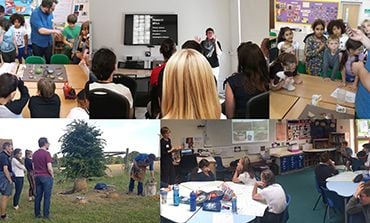Between ‘Two Cultures’
Dr Pete Hommel from the School of Archaeology is working with teachers and heritage professionals to build new links between the STEM subjects and the arts and humanities at Key Stage 2.

Through a series of conversations, surveys and focus groups, Dr Hommel has built a clearer understanding of the challenges facing teachers as they introduce children to concepts of deep time and ways of life that may seem quite unlike their own. He found that, while most teachers were positive about Prehistory, many felt that the teaching resources available were less stimulating than for other parts of the History curriculum, and in some cases perpetuated unhelpful stereotypes about the way in which human society has developed.
As an archaeologist working between the arts and sciences, Dr Hommel was particularly interested by a perceived lack of opportunities for teaching across the curriculum. Working with teachers, parents and other external partners, he has been able to demonstrate a strong potential for resources that enable pupils to discover how knowledge about life in the past is generated. For instance, how scientific approaches are used by archaeologists to study ancient diets from isotopes in bones and residues of fats and proteins in ceramic pots and how pollen can reveal long-term climate changes, and our own impact, on the local environment.
Dr Hommel’s initial focus group discussions with teachers and other external partners shaped his thinking as he started to develop pilot resources. Later he began to go out to schools, offering hands-on activity days based around archaeological science. Working with schools in and around Oxford, he was able to get valuable feedback from teachers, parents and pupils about the developing resources, and a direct understanding of what sparks new interest in a classroom – and what does not!
The KE Seed Fund has been critical in facilitating Dr Hommel’s project, providing him not only with the means to bring people together and to develop ideas, but also with the flexibility to adapt his approach to working with teachers. He also found it to be a valuable source of advice, encouragement and support.
“The great thing about the grant,” says Dr Hommel, “is that it’s not just about delivering a specific event. It’s about supporting researchers to explore a process, and truly engage and exchange with external partners. I’ve gained so much from this approach: it has increased my understanding of what it means to share knowledge with different audiences and substantially changed the priorities in my own research.”
The next step will be to continue to develop the pilot teaching resources, and to test and refine these in the classroom. “This will obviously take more time and funding” says Dr Hommel, “but the potential to develop engaging resources based on high-quality academic research is definitely there. And the KE Seed Fund has been essential in allowing me to kick-start this process.”
Funders: Knowledge Exchange Seed Fund, European Research Council (FeedSax and FLAME)